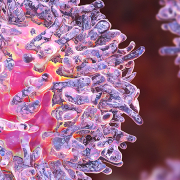New gene therapy hubs announced
A network of ‘innovation hubs’ are set to advance the clinical development of novel gene therapy treatments in the UK
The Medical Research Council (MRC) and science funding charity LifeArc, with support from the Biotechnology and Biological Sciences Research Council, have announced investments to create a national network of gene therapy facilities in the UK.
From research to clinic
The project will consist of three dedicated gene therapy innovation hubs that will help bridge the gap between academic research and the clinic, with the aim of bringing novel treatments to patients more quickly.
“Recent innovations in gene therapies hold enormous potential for treating conditions such as rare diseases, but often promising ideas – particularly in academia – are not making it through to patients,” said chief executive officer of LifeArc, Melanie Lee.
She added: “Through our collaboration, we aim to meet the need for researchers to have access to the essential facilities and translational advice to progress promising research.”
What is a gene therapy?
Many human diseases are caused when a person lacks a functional copy of an essential gene. Some rare conditions, such as Duchenne muscular dystrophy and cystic fibrosis, are caused in this way, and many of them are difficult to treat or incurable.
Gene therapy is the name given to treatment approaches that try to remove, replace or modify a gene with a disease-causing variant to slow the progression of the condition, or to reduce symptoms. Some gene therapies can also be curative.
Delivering the new copy of the gene into the patient’s cells and having it work correctly can be very complicated. Often, the replacement DNA is packaged inside a harmless virus shell called a viral vector which delivers the DNA into the patient’s cells, but cannot replicate and cause infection like a virus normally would.
These treatments can be extremely effective, but they are also often costly and require extensive research, as is the case with Zolgensma: a gene therapy treatment for spinal muscular atropy, which we recently covered in this blog. It can take a long time for patients to receive what would be life-changing or even life-saving treatments, especially if expertise and resources are not shared efficiently between researchers.
Three hubs: one network
The three hubs will be in different regions of England, but they will operate as a coordinated network, collaborating to share research, facilities and expertise.
They will also develop and offer training programmes to teach skills and knowledge related to ‘good manufacturing practice’ (GMP): guidance that helps to clarify the standards that need to be met when manufacturing medicines. These programmes will aim to address critical skill shortages in the academic and commercial sectors.
In addition to the common goals of the network, each hub will have a unique focus:
- The hub based at the University of Sheffield, led by Professor Mimoun Azzouz, will focus on supporting the development of gene therapies arising from research at UK universities. It will do this by providing help with the quality assurance, regulatory certification and governance necessary when establishing a clinical trial.
- The hub based at the NHSBT Filton Blood Centre in Bristol will support academic-led early phase clinical trials for novel gene therapies, and will have the capability to manufacture gene therapies, in accordance with GMP.
- The third hub, a collaboration between King’s College London, the Royal Free Hospital and University College London, and led by Professor Robin Ali, will produce the viral vectors used to deliver gene therapy to patient cells, for use in early-phase trials.
A cross-network coordination committee has been put in place to oversee the creation and ongoing operation of the hubs, to ensure the success of the project and its ongoing commitment to the development of new genetic medicines.
LifeArc have requested that enquiries about the gene therapy innovation hub project be addressed to viralvector@mrc.ukri.org.
FAQs can be found on the LifeArc website.
Want to learn more about gene therapy and its role in healthcare? Take a look at our dedicated blog topic
–









